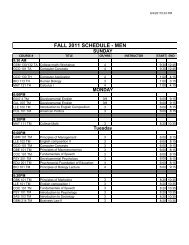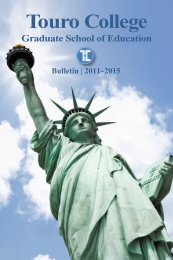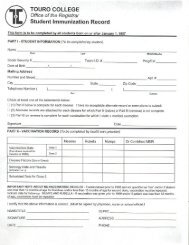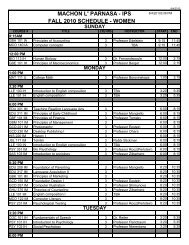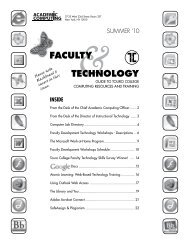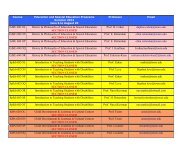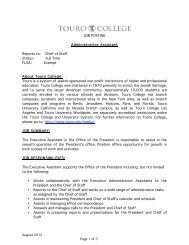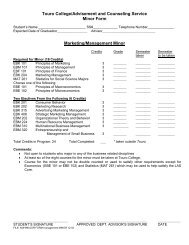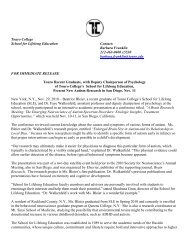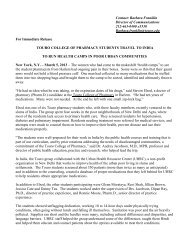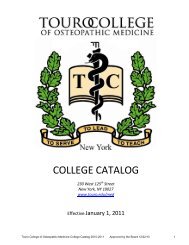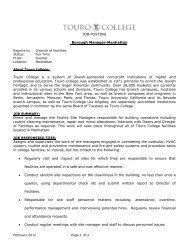Making the World a Better Place - Touro College
Making the World a Better Place - Touro College
Making the World a Better Place - Touro College
Create successful ePaper yourself
Turn your PDF publications into a flip-book with our unique Google optimized e-Paper software.
Language of <strong>the</strong> Heart<br />
Russian-Speaking Aphasia Group at <strong>the</strong> School<br />
of Health Sciences<br />
Naum, a Russian-born engineer, once spoke nine<br />
languages, but now he has trouble eking out more than<br />
four words at a time.<br />
Support group for Russianspeaking<br />
aphasia patients at<br />
<strong>the</strong> <strong>Touro</strong> <strong>College</strong> Speech and<br />
Hearing Center.<br />
Three and a half years ago, Naum had a<br />
stroke while driving his car, leaving him with<br />
aphasia, a frustrating launguage disorder,<br />
which is caused by an injury to <strong>the</strong> part of <strong>the</strong><br />
brain that controls speech.<br />
On a recent Thursday, at a support group<br />
for Russian-speaking aphasia patients run in<br />
Brooklyn at <strong>the</strong> <strong>Touro</strong> <strong>College</strong> Speech and<br />
Hearing Center, Naum’s caretaker sat<br />
behind him. She was translating Naum’s<br />
story to a young woman who had stopped by<br />
to observe <strong>the</strong> weekly group. Sitting in a<br />
small chair, Naum nodded and said, in<br />
English, “I know. It’s good, it’s good.” But his<br />
frustration was apparent.<br />
“Parle Italiano?” <strong>the</strong> woman asked.<br />
When Naum heard <strong>the</strong> romance<br />
language, he started shrieking, in<br />
English, “Yes, yes, take it, take it!” He<br />
was nearly jumping out of <strong>the</strong> chair as<br />
his colleagues turned to see what was<br />
happening. As it turns out, Naum had<br />
once lived in Italy, not far from <strong>the</strong> sea.<br />
Surprised by <strong>the</strong> force of his response,<br />
<strong>the</strong> woman hesitated, prompting Naum<br />
to gesture with his hands and shout,<br />
“More like this, more like this!” The<br />
more she spoke in Italian, <strong>the</strong> more he<br />
said, “I know this also!”<br />
This spirited exchange exemplifies<br />
<strong>the</strong> basic philosophy of <strong>the</strong> aphasia<br />
group: when patients’ emotions are<br />
stirred, <strong>the</strong>ir desire to communicate<br />
becomes stronger than <strong>the</strong>ir often<br />
severe limitations, which range from having<br />
difficulty remembering words or making<br />
sounds, to <strong>the</strong> total loss of language.<br />
Usually <strong>the</strong> result of a stroke, aphasia can<br />
take different forms, depending on <strong>the</strong><br />
degree of damage and <strong>the</strong> area of <strong>the</strong> brain<br />
affected. With expressive aphasia, patients<br />
know what <strong>the</strong>y want to say, but have<br />
difficulty speaking or writing. With receptive<br />
aphasia, patients can hear o<strong>the</strong>rs speak or<br />
<strong>the</strong>y can see printed words, but cannot make<br />
sense of <strong>the</strong> language. With anomic aphasia,<br />
patients often can’t retrieve words for<br />
objects, places or events. With global<br />
aphasia, <strong>the</strong> most devastating kind, patients<br />
lose all means of communication and are<br />
TOURO LINKS I SPRING 2013 23



